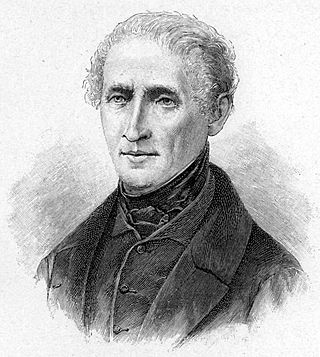Related Research Articles

Joseph Freiherr von Eichendorff was a German poet, novelist, playwright, literary critic, translator, and anthologist. Eichendorff was one of the major writers and critics of Romanticism. Ever since their publication and up to the present day, some of his works have been very popular in Germany.

Wilhelm Scherer was a German philologist and historian of literature. He was known as a positivist because he based much of his work on "hypotheses on detailed historical research, and rooted every literary phenomenon in 'objective' historical or philological facts". His positivism is different due to his involvement with his nationalist goals. His major contribution to the movement was his speculation that culture cycled in a six-hundred-year period.

Friedrich Kluge was a German philologist and educator. He is known for the Kluge etymological dictionary of the German language, which was first published in 1883.
Ernst-Jürgen Dreyer was a German writer, translator, playwright and musicologist.
Werner Spies is a German art historian, journalist and exhibition organizer. From 1997 to 2000, he was a director of the Centre Georges Pompidou in Paris. Klaus Albrecht Schröder, director of the Albertina in Vienna, has called Spies "one of the most influential art historians of the 20th century."
Carl Franz van der Velde was a German author of historical novels.

Reinhard Jirgl is a German writer.

Walter Hinck was a German Germanist and writer. He was professor of German literature at the University of Cologne from 1964 to 1987.
Wolfram Steinbeck is a German musicologist.

Arnold Schmitz was a German musicologist who was particularly concerned with Beethoven.
Fritz Strich was a Swiss-German literature historian.
Walther Rehm was a German literary scholar.
Norbert Miller is a German scholar of literature and art. He was professor of literary studies at the Technische Universität Berlin from 1973 and retired in 2006.
Arno Forchert was a German musicologist.
Michael Maaser is a German historian, archivist of the Goethe University Frankfurt.
Notker Hammerstein is a German historian. His research interests are mainly in the field of University history and history of science as well as the history of the Holy Roman Empire of the German Nation.
Daniela Philippi is a German musicologist with a research focus on Christoph Willibald Gluck, Antonín Dvořák and Czech music history and music of the 20th century.
Hedwig Forstreuter, was a German journalist and writer.

Friedrich von der Leyen was a German philologist who specialized in Germanic studies.

Wolfgang Golther was a German philologist who specialized in Germanic studies. A professor at the University of Rostock, Golther was a prominent authority on Medieval German literature and Germanic religion.
References
- ↑ Dichtungen [von] Jean Paul. Eingeleitet von Paul Requadt on Stanford.edu
- ↑ Requadt, Paul (1902-1983) on Kalliope-Verbunt
- ↑ Paul Requadt, Die Bildersprache der deutschen Italiendichtung von Goethe bis Benn on Tandfonline
- ↑ Paul Requadt on gutenberg-biographics
- ↑ Paul Requadt on Sudoc
- ↑ Paul Requadt on Deutsche-digitale-bibliothek
- ↑ Beethoven on Google Books
- ↑ Bildlichkeit der Dichtung. Aufsätze zur deutschen Literatur vom 18. bis 20. Jahrhundert on WorldCat